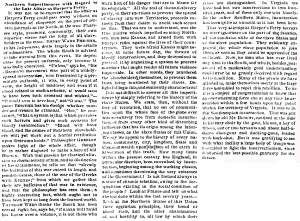Record Data
Transcription
The following text is presented here in complete form, as true to the original written document as possible. Spelling and other typographical errors have been preserved as in the original.
Northern Impertinences with Regard to the Late Affair at Harpers Ferry.
It was not to be expected that the affair at Harpers Ferry could pass away without an abundance of eloquence on the part of certain journals at the North, in the true Pharisee style, assuming, continually, their own superior virtue and the folly of all slaveholders in the mass. Henry Ward Beecher, in his Independent, deals largely in the article of admonition. The whole South is advised to take warning from this event. He deprecates the present outbreak, only because it was badly conceived. “Unless,” says he “his (Brown’s) movement was part of a widely spread insurrection, now frustrated by a premature outbreak, it was, in every point of view, the height of madness; and even if it stood related to such a scheme, it would seem to have been both criminal and wicked.”-“It would seem to have been” and not “it was.” The pious Beecher has had his doubts whether murder and treason could be criminal. “But,” he continues, “what a system is that which provokes such horrors and gives such occasions for bloody insurrection?” “Blood will have blood, and the crimes of the Southern slaveholders will yet work out a fearful retribution upon their own heads.” Philosopher Greeley makes light of the whole affair, though he is rather disposed to make a hero of Old Brown. With that passion for classical allusion so characteristic, and so distinctive of his attainments, he tells that “already the bulletins of this war exceed in length and ponderousness, those of the war of the Greeks with Xerxes,” from which we gather that there are bulletins of that war in existence, and that the philosopher has seen them; a highly interesting fact, which ought not to have been kept so long from the learned world. Thurlow Weed thinks the South has been served right; for, says he, “if a man will build the house over a volcano, it is not those who warn him of his danger that are to blame for the eruption.” All the zeal of the anti-slavery party, in their exertions to prevent the spread of slavery into the new Territories, proceeds entirely from their desire to avoid such scenes as this. That we are understand, was the true motive which impelled many Northern men into Kansas, and armed them with Sharpe’s rifles against the lives of their countrymen. They were afraid that Kansas might become, at some future day, the theatre of bloody insurrections, and they determined to prevent it by organizing a system to prevent murders that it might render all future violence impossible. In other words, they murdered the slaveholders themselves, to prevent them from being murdered by their slaves. Delightful logic this, and eminently characteristic!
It is not difficult to answer all this impertinence by simply referring to the history of the slave States. We state, then, without the fear of resonation, that no set of communities upon the whole face of the globe ever was so entirely free from domestic insurrection, or from every other kind of disturbing influence that had its origin among the laboring classes, as the slave States of this Union. We say we appeal to the history of every nation, community, city, kingdom, State and Commonwealth upon the face of the earth in attestation to the truth. How many times within the present century has England, in particular districts, been convulsed by insurrection, beginning among the working classes and sometimes threatening the very existence of the Government? Is not Ireland always in a state of chronic rebellion, owing to the inequalities existing in the social conditions of the people? Look at France and tell us what she has done within the last seventy years.-Look at the Northern States of the Union their agrarian principles, their bread or blood riots, and the utter abandonment of, and hostility to, all law by which their cities are distinguished. In Virginia we have had but two insurrections in two hundred years, and of these only one was bloody. In the other Southern States, insurrection has been quite as unusual as it has been here.
This very attempt at Harpers Ferry betrays an utter ignorance on the part of the fanatics of the conditions alike of the slave State and of the slave population. They evidently expected the whole slave population to join them, as soon as they could be apprised of the outbreak. Now, no man who has ever lived any time in the South, and who is, besides, possessed of a moderately good understanding could ever be so grossly deceived with regard to its condition. Many of the prints we have alluded to, make themselves merry at the large force assembled to repel this rebellion. To us it is a subject of congratulation to know that an overwhelming force can at any time be assembled within a few hours upon any point within the territory of Virginia. It was so in the Southhampton insurrection. That was put down by old Mr. Blount, confined at the time to his easy chair by the gout, his son, a boy of fifteen, one or two servants and about half a dozen shot-guns and ducking guns, loaded with buck-shot. But it was gratifying to see with what facility a large body of troops was assembled to fight the insurrectionists, since it afforded the best possible guarantee for the future.






